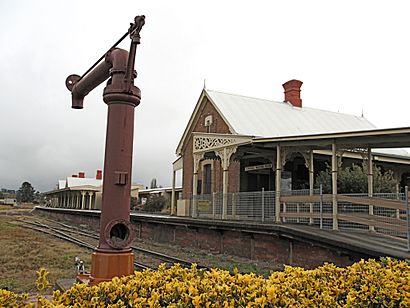Blayney railway station facts for kids
Quick facts for kids
Blayney
|
|||||||||||||||
|---|---|---|---|---|---|---|---|---|---|---|---|---|---|---|---|

Disused Blayney-Demondrille line platform
in July 2010 |
|||||||||||||||
| Location | Railway Lane, Blayney | ||||||||||||||
| Coordinates | 33°31′38″S 149°15′16″E / 33.5271°S 149.2545°E | ||||||||||||||
| Owned by | Transport Asset Holding Entity | ||||||||||||||
| Operated by | NSW TrainLink | ||||||||||||||
| Line(s) | Main Western Blayney-Demondrille |
||||||||||||||
| Distance | 290.37 kilometres from Central | ||||||||||||||
| Platforms | 1 | ||||||||||||||
| Tracks | 2 | ||||||||||||||
| Construction | |||||||||||||||
| Structure type | Ground | ||||||||||||||
| Disabled access | Yes | ||||||||||||||
| Other information | |||||||||||||||
| Station code | BLA | ||||||||||||||
| History | |||||||||||||||
| Opened | 1 November 1876 | ||||||||||||||
| Services | |||||||||||||||
|
|||||||||||||||
Blayney railway station is a historic train station in Blayney, Australia. It is located on the important Main Western railway line. This station is very old and special. Because of its history and design, it is listed on the New South Wales State Heritage Register. This means it is protected for future generations to enjoy.
Contents
A Look Back: Blayney Station's History
The Blayney station first opened its doors on 1 November 1876. This happened when the railway line was extended from Bathurst.
Later, in 1888, Blayney became an even more important station. This was because the Blayney-Demondrille line also opened. This made Blayney a "junction station," where different train lines meet.
Across from the main platform, there is a special area called an intermodal freight depot. This depot opened in 1994. It's where goods are moved between trains and trucks.
What Trains Stop Here?
Blayney station is served by NSW TrainLink, which is a train service in New South Wales.
- The Central West XPT train stops here every day. This train travels between Sydney and Dubbo.
- The Outback Xplorer train also stops here once a week. This train takes passengers on a long journey between Sydney and Broken Hill.
Besides trains, NSW TrainLink also offers road coach services. These buses connect Blayney station to other towns. You can catch a bus here to places like Lithgow, Orange, and Grenfell.
| Platform | Line | Stopping pattern | Notes |
| 1 |
Western Region
|
services to Sydney Central , Dubbo & Broken Hill |
|---|
Exploring Blayney Station's Buildings
The Blayney station has several interesting buildings that are part of its heritage listing.
- There's a brick station building and a residence (a house) that were built in 1876.
- Another brick station building, built in 1889, has a unique design with timber posts and pointed roofs called gables.
- The platforms themselves are made of stone and date back to 1876 and 1889.
All these buildings are connected by a long roof called an awning. This awning is held up by wooden posts with fancy metal brackets. There's also a former railway refreshment room from 1889. Other station buildings were added in 1890, 1901, and 1902. Even the old station residence and a brick booking office are part of the heritage site.
Why Blayney Station is Special
The Blayney railway station complex is a very important building in the town. It looks impressive, especially when you see it from the road approaching from Bathurst. The high quality of the station buildings shows how important this location was as a junction station.
The first station building is one of only five similar ones left from 1888. The addition built in 1889 was made to match the original building. The separate booking office is also very unique and important. The whole group of buildings is in good condition and looks great together. It's a key part of Blayney's town and street view.
The site clearly shows how the station grew over time. It also highlights the beautiful public buildings from that period. Blayney railway station was officially listed on the New South Wales State Heritage Register on 2 April 1999. This means it meets special requirements for its historical and cultural value.
 | Stephanie Wilson |
 | Charles Bolden |
 | Ronald McNair |
 | Frederick D. Gregory |

